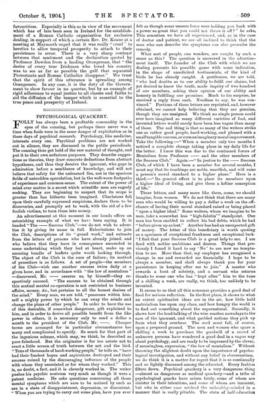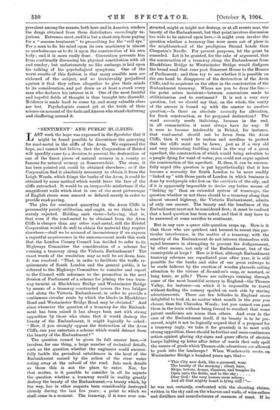F OLLY has always been a profitable commodity in the eyes
of the cunning, but perhaps there never was a time when fools were in the same danger of exploitation as in these days of psychical research. Psychology, like medicine, interests every one. Psychical problems are not worked out in silence, they are discussed in the public periodicals. The cunning thus get hold of the raw material of thought, and put it to their own nefarious purposes. They describe sugges- tions as theories, they draw concrete deductions from abstract hypotheses, and thus they deceive the ignorant, who gape in admiration before a semblance of knowledge, and will not believe that safety for the unlearned lies, not in the spacious fields of untrodden speculation, but in the well-worn footpaths of experience and common-sense. The extent of the power of mind over matter is a secret which scientific men are eagerly seeking. They are beginning to suspect that its scope is greater than has hitherto been imagined. Charlatans fall upon their carefully expressed suspicions, declare them to be discoveries, and promptly set to work, with the aid of a few foolish victims, to turn them into money.
An advertisement at this moment in our hands offers an astonishing example of what we have been saying. It is headed "The — Success Club,"—we do not wish to adver- tise it by giving its name in full. Exhortations to join the Club, descriptions of its "grand work," and extracts from the letters of persons who have already joined, and who believe that they have in consequence succeeded in some undertaking which they had at heart, make up an amusing bundle of leaflets quite worth looking through. The object of the Club is the cure of failure ; its method of procedure is as follows. A set of people—the members of the Club—wish one another success twice daily at a given hour, and in accordance with "the law of mentalism" —discovered, Mr. — assures us, by himself—they re- spectively succeed. "The success to be obtained through this mutual mental co-operation is not restricted to business affairs, money, Acc., but pertains to all the honest desires of the mind." Every man, we are told, "possesses within him- self a mighty power by which he can sway the minds and change the plans of other people." In order to have the use of this desirable, if somewhat dangerous, gift explained to him, and in order to derive all possible benefit from the like power in others, it is necessary only to send a dollar a month to the president of the Club, Mr. —. Cheaper terms are arranged for in particular circumstances too many and complicated to specify. So much for that part of the ingenious scheme, which may, we think, be described as pure falsehood. But the originator is far too astute not to erect a little screen of truth between the net and the bird. "Tens of thousands of hard-working people," he tells us, "have had their fondest hopes and aspirations destroyed and their success ruined by the discouraging influence of the people with whom they associated or for whom they worked." This is, no doubt, a fact, and it is cleverly worked in. The writer pushes his psychic nostrum very much as though it were a patent medicine. He asks questions concerning all those mental symptoms which are sure to be noticed by such as are in a state of disappointment, depression, or discontent. "When you are trying to carry out some plan, have you ever felt as though some unseen force were holding you back with a power so great that you could not throw it off ? " he asks, This sensation we have all experienced, and, as in the case of doctor and patient, we are all inclined to think that the man who can describe the symptoms can also prescribe the remedy.
What sort of people, one wonders, are caught by such a snare as this ? The question is answered in the advertise- ment itself. The founder of the Club with which we are dealing presents his possible game with some indication, in the shape of unsolicited testimonials, of the kind of birds he has already caught. A gentleman, we are told, "who had doubts as to our ability to fulfil our claims, but yet desired to know the truth, made inquiry of two hundred of our members, asking their opinion of our ability and honesty in fulfilling our promises. Much to his surprise, he received a reply from each. Needless to say, he was con- vinced." Portions of these letters are reprinted, and, however obtained, we cannot help believing that they are genuine, though they are unsigned. We think no single person could ever have imagined so many different varieties of fool, and invented letters would surely have been less vague than many of these. The sad thing is that so many of the writers strike one as rather good people, hard-working, and pleased with a small tangible success, or even an imaginary moral improvement. Take the following :—" When a member only two months I noticed a complete change taking place in my daily life for the better. I know this was due to the continued forces of Mentalism from Professor — and the other members of the Success Club." Again :—" In justice to the — Success Club, of which I have been a member for several months, I must say that its teachings are noble, unselfish, and will raise a person's moral standard to a higher plane." Here is a third :—" Its general effect is to place its members upon a higher ideal of living, and give them a loftier conception of life."
These letters, and many more like them, come, we should imagine, from women. We do not think that there are many men who would be willing to pay a dollar a week on the off- chance of having their moral standard raised or being placed "upon a higher ideal." Some writers, whom we imagine to be men, take a somewhat less " high-falutin' " standpoint. One man has been enabled to collect his bad debts, which he had "before given up as lost." Another has had an unexpected gift of money. The letter of this beneficiary is worth quoting as a specimen of exceptional frankness and exceptional luck- " I find that your Success Club is a great help to me. I am fired with nobler ambitions and desires. Things that pre- viously I found it hard to say 'Nov to are now no tempta- tion to me. More than that, my employer has recognised a change in me and rewarded me financially. I hope to be always a member, and shall always thank you for your persistence in keeping after me to join." A master who rewards a bout of sobriety, and a servant who returns thanks to some one who has "kept after" him to the tune of a shilling a week, are really, we think, too unlikely to be invented.
It seems to us that all this nonsense provides a good deal of food for serious reflection. In the first place, it shows to what an extent spiritualist ideas are in the air, how little hold materialism has upon any class, and how hungry the world is to had out something about the supernatural. Secondly, it shows how the loud talking of the wise reaches nowadays to the ears of the ignorant, and what garbled notions they pick up from what they overhear. The seed must fall, of course, upon a prepared ground. The men and women who spare a shilling a week to purchase the goodwill of a crowd of unknown persons have wondered a good deal in a vague way about psychology, and are ready to be impressed by the clever, if meaningless, expression, "the law of mentalism." Without throwing the slightest doubt upon the importance of psycho- logical investigation, and without any belief in obscurantism, we do think it is a matter for regret that it is so continually and so lightly discussed among the educated. Every fashion filters down. Psychical quackery is a very dangerous thing —almost as dangerous as medical quackery—and a tribe of psychological quacks have arisen lately, some of whom are sinister in their intentions, and some of whom are innocent, but who in either case mislead the unhealthy-minded in a manner that is really pitiable. The state of half-education
prevalent among the masses, both here and in America, renders the drugs obtained from these distributors exceedingly in- jurious. Extremes meet, and it is but a short step from paying for a "success treatment" to prescribing for the "evil eye." For a man to fix his mind upon its own machinery is almost as unwholesome as to fix it upon the construction of his own body; and it is more easily done. Convention prevents him from continually discussing his physical constitution with all and sundry; but unfortunately no like embargo is laid upon his talking of his psychological symptoms. One of the worst results of this fashion is that many sensible men are sickened of the subject, and so irretrievably prejudiced against it that they refuse altogether to give their minds to its consideration, and put down as at least a crank every man who declares his interest in it. One of the most fruitful and hopeful fields of thought is thus brought into discredit. Evidence is made hard to come by, and many valuable clues are lost. Psychologists cannot get at the truth of their science on account of the fools and knaves who stand chattering and chaffering around it.











































 Previous page
Previous page